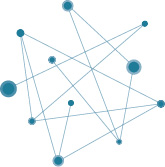This is the sixth post in a series about the Transformative Change Initiative (TCI) and is based on the 2014 TCI booklet. This post discusses the third guiding principle in the TCI Framework.
When community colleges engage in TAACCCT and other similar initiatives, they become part of a larger network of community colleges across the US that have similar goals and intended outcomes. Consortia created through TAACCCT bring together community colleges in networks that connect to other colleges and universities, workforce providers, and employers to address current workforce, economic, and social concerns. To do this, community colleges sometimes benefit from local, state, and national expertise and opportunities to share resources. Formal partnerships are sometimes formed to facilitate the resolution of important problems and address persistent or emerging needs.
Networks can be vital to sharing information about how educational systems, workforce training systems, industry sectors, and labor markets work. They can be useful to understanding how what is happening locally, regionally or statewide is aligned with national and international developments. Working in conjunction with others who are part of a network can also benefit learners by preparing them to navigate pathways through postsecondary education and into the workforce. Paying close attention to how learners navigate challenges and experience successes can be useful to improving individual outcomes and system performance.
What networks do you and your colleagues find useful to developing effective pathways for your students and facilitating their success? How can these networks be tapped to serve the needs of all learners who can benefit from TAACCCT? What recommendations do you have for the Transformative Change Initiative (TCI) to utilize its network to serve your individual or organizational needs?
Debra Bragg, OCCRL director and endowed professor at Illinois, researches the transition to college by youth and adults, especially student populations that have not attended college historically.




